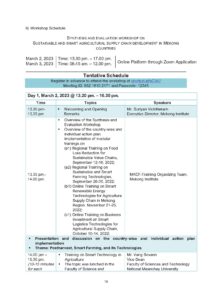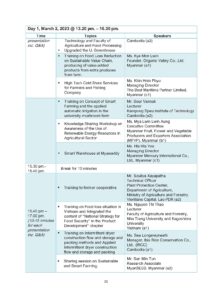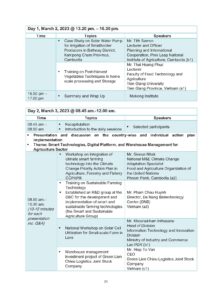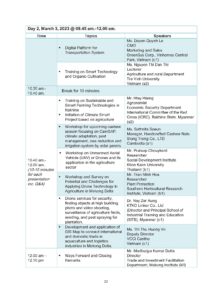The Mekong-Republic of Korea Cooperation Fund (MKCF) provided support for training at the Mekong Institute (MI) in three thematic areas, including Agricultural Development and Commercialization (ADC), Trade and Investment Facilitation (TIF), and Sustainable Energy and Environment (SEE). This series of training programs was funded through the project on ‘Sustainable and Smart Agricultural Supply Chain Development in Mekong Countries’. The objective of these programs was to enhance the effectiveness and efficiency of production, reduce post-harvest losses, and increase energy efficiency in agricultural supply chains in Mekong countries. The project addressed the pressing need to transform agricultural supply chains (production, processing, and distribution) in the Mekong countries through the implementation of smart agriculture, smart logistics, and smart renewable energy technologies. This transformation is intended to contribute to several sustainable development goals (SDGs), including ending poverty and hunger, promoting energy efficiency, responding to climate change, achieving inclusive growth, building a resilient society, and maintaining natural resources in a sustainable manner.
Under the project framework, five core learning activities were implemented;
vi.) Regional Training on Food Loss Reduction for Sustainable Value Chains, September 12-16, 2022;
vii.) Regional Training on Sustainable and Smart Farming Technologies, September 26-30, 2022;
viii.) Online Training on Business Investment on Smart Logistics Technologies for Agricultural Supply Chain, October 10-14, 2022;
ix.) Online Training on Smart Renewable Energy Technologies for Agriculture Supply Chain in Mekong Region, November 21-25, 2022;
x.) Online workshops on “Supplement knowledge topic/issue required during implementing the action plans” for deeper understanding of the topics to support the implementation as follows
- a. Workshop on Business Plan Development – Tools and Strategies, October 17-21, 2023;
- b. Workshop on Solar Pumps for Smallholder Farmers in Cambodia on January 10, 2023;
- c. Workshop on Small and Micro-scale Applications of Biomass Energy, February 3, 2023.
- d. Workshop on Drone and its Applications in the Agricultural Sector on February 13, 2023.
The training program incorporated the preparation of both country-specific and individual action plans (AP) as a means of sharing the knowledge and experiences gained by participants with relevant stakeholders and beneficiaries in the Mekong countries, which included Cambodia, Lao PDR, Myanmar, Thailand, and Vietnam. The action plans were implemented through various national workshops and training sessions, as well as the integration of relevant content into curricula, research, and business plan development within their respective countries.
To review the results of the learning and action plan implementation, and to receive feedback on the four training cycles (i-iv), a two-day Synthesis and Evaluation Workshop (S&E) is scheduled for March 2-3, 2023, to be conducted online. The S&E workshop aims to (i) provide a platform for participants to present the results of their action plan implementation, (ii) share best practices and outcomes from their implementation experience, and (iii) reflect on their feedback to contribute to the improvement of the training contents.
The specific objectives of the Synthesis & Evaluation Workshop are to:
e) Recall the knowledge gained from the training programs on
(v) Food Loss Reduction for Sustainable Value Chains, September 12-16, 2022;
(vi) Sustainable and Smart Farming Technologies, September 26-30, 2022;
(vii) Business Investment on Smart Logistics Technologies for Agricultural Supply Chain in Mekong Region, November 21-25, 2022;
f) Share experiences of implementing the action plans and obtain feedback from co- participants;
g) Provide an opportunity to learn and share best practices and utilize the learning results;
h) Evaluate the training approach and provide recommendations for future improvement in terms of contents, structure, and schedule.
The S&E workshop has been structured to provide participants with an opportunity to present their experiences of implementing the action plans in the form of a PowerPoint presentation, which will incorporate photographs, videos, and posters of the implemented activities, as well as key points of the presentation contents. These key points are expected to include:
- A brief introduction to the event and its objectives,
- Information on the structure and contents of the event,
- The participants involved,
- Any challenges encountered during the action plan implementation,
- Lessons learned from organizing the event, and
- Recommendations for further capacity-building activities and policy initiatives for national governments to continue applying sustainable and smart technologies to the development of agriculture supply chains in their respective countries.
In addition to providing a platform for presenting action plan implementation experiences, the workshop will also serve as a forum for the exchange of experiences and lessons learned among participants.
The workshop has been designed for participants who attended the four training programs held through face-to-face and virtual platforms between September and December 2022. These participants were drawn from the Mekong countries and included senior officials from the national Ministries of Agriculture, Land and Transport, and Energy, as well as members of business associations and service providers in the areas of agribusiness, logistics, and energy.
The workshop is intended to deepen participants’ understanding of the impact of the capacity development program, including the trainings provided, on the implementation of the completed action plans. It is also an opportunity for MI to receive specific recommendations from the participants regarding the further development of MI’s training programs. Furthermore, the workshop will serve as a platform for participants to provide policy recommendations for national governments to advance sustainable and smart technologies for agriculture supply chain development efforts in their respective countries.
MKCF’s Project Implementing Team
Telephone: +66 (0) 43 202411, Extension 2102 (TIF), 3103 (ADC) and 4102 (SEE)
Email: [email protected]
Mekong Institute
123 Mittraphap Road, Muang District,
Khon Kaen 40002, Thailand
Website: https://www.mekonginstitute.org






